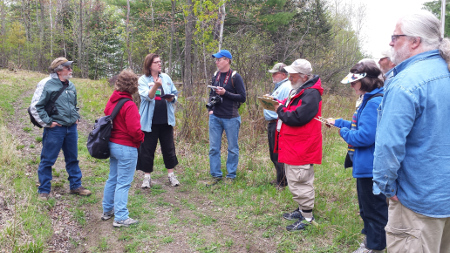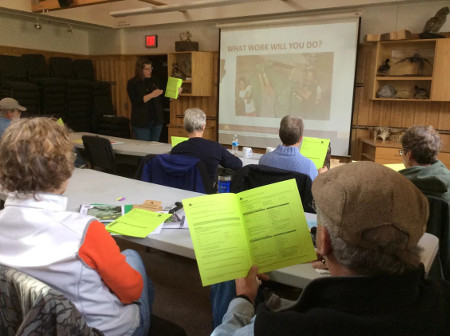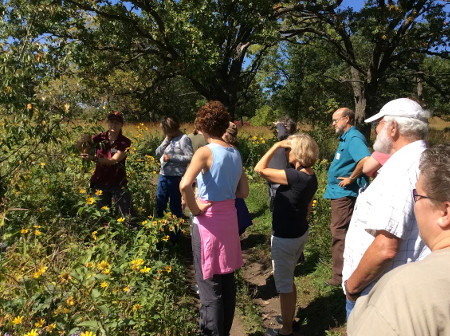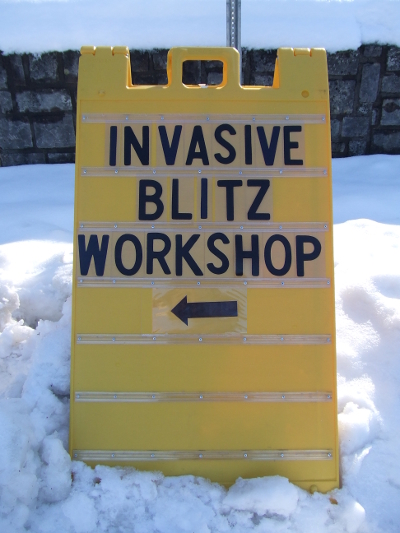Invasive Species
 Photo Credit: UMN Extension.
Photo Credit: UMN Extension.Invasive Species Blitz Program Materials
As you may know, invasive species such as buckthorn, garlic mustard, and wild parsnip pose serious threats to Minnesota’s natural resources, ecosystems, and economy. These materials help new volunteers to join in a statewide effort to tackle the growing problem of invasive species.
The tools on this page and the links below will help you make a plan to manage invasive species at a site of your choosing and host local invasive plant removal events. You may even wish to adopt a local natural area you can regularly monitor and provide stewardship for into the future.
Quick Menu
Tools | Recommended Resources | Species-specific Resources | Story Map Photo Credit: UMN Extension.
Photo Credit: UMN Extension.Tools
Invasive Species Project Planner
A useful document to help you plan your own event with one or more partner organizations. (PDF, 433KB.
Prioritizing Invasive Plant Control
A reprint of a Nature Conservancy article on how to assess your land and prioritize invasive species removal to measure success and keep you motivated to finish the job. (PDF, 779KB.)
Invasive Species Management Matrix
Provides details for best practices and removal timing for the five most common terrestrial invasives in Minnesota. (PDF, 384KB.)
Native Urban Trees of Southeast Minnesota
A useful guide to tree selection with links to other publications for other areas. (PDF, 543KB.)
 Photo Credit: UMN Extension.
Photo Credit: UMN Extension.Recommended Resources
Minnesota Noxious List
Minnesota Department of Agriculture noxious weed list. (PDF, 295KB)
Guidelines for Disposal of Terrestrial Invasive Plants
The Connecticut Department of Energy and Environmental Protection and the University of Connecticut guidelines for disposal of terrestrial invasive plants. (PDF, 4.32MB)
BioBlitz Guides
 Photo Credit: UMN Extension.
Photo Credit: UMN Extension.Species-specific Resources
Amur Silver Grass
Birdsfoot Trefoil
Black Swallow-wort
Brown Knapweed
Buckthorn: What You Should Know. What You Can Do.
Minnesota DNR Buckthorn Buckthorn resource. (PDF, 5.94MB)
Bull Thistle
Burnet Saxifrage
Butter & Eggs
Canada Thistle
Common and Cutleaf Teasel
Common Tansy
Creeping Charlie
Crown Vetch
Dalmatian Toadflax
Diffuse Knapweed
Garlic Mustard
Giant Hogweed
Giant Knotweed
Grecian Foxglove
Hedge Parsleys
University of Wisconsin-Extension and Nutrient and Pest Management University of Wisconsin Hedge Parsleys resource. (PDF, 245KB)
Hoary Alyssum
Japanese Honeysuckle
Indiana Invasive Plant Species Assessment Working Group Japanese Honeysuckle resource. (PDF, 731KB)
Japanese Hops
Japanese Knotweed
USDA and U.S. Forest Service Japanese Knotweed resource. (PDF, 234KB)
Leafy Spurge
Meadow Knapweed
Mock Strawberry
Musk Thistle
Narrowleaf Bittercress
Orange Hawkweed
Oxeye Daisy
Palmer Amaranth
Perennial Sowthistle
Plumeless Thistle
Poison Hemlock
Porcelain Berry
Queen Anne's Lace
Siberian Squill
Smooth Brome Grass
Spotted Knapweed
White and Yellow Sweetclover
Wild Parsnip
University of Minnesota-Extension Wild Parsnip resource. (PDF, 1.86MB)
Yellow Bedstraw
Yellow Starthistle
Story Map
